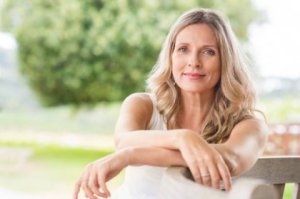"I Feel Old": Women and Aging

It’s no secret that society puts a lot of pressure on women when it comes to aging. Women aren’t supposed to age. They’re supposed to be ashamed of their age, wrinkles, and grey hair. Why does it have to be that way? Why do so many women complain about feeling old? Why are there so many negative ideas about the passage of time? And why is “I feel old” such a common phrase among women?
From the way we talk about it, you’d think that youth is positive and that old age is a time of loss and depression. However, youth isn’t as marvelous as it seems, and it’s certainly not devoid of problems. Nor is aging synonymous with death and decay. There are plenty of examples to help prove this point.
“I feel old” is an expression that’s worth putting under a microscope. Primarily because it’s something that you usually hear from middle-aged women. In other words, they haven’t “officially” entered old age. In this article, we’re going to analyze the context of this expression and what it means for women and society as a whole.
“Aging is an extraordinary process where you become the person you always should have been.”
-David Bowie-
I feel old…Why?
Implicitly, the expression “I feel old” relates to some specific facts. Many times, it’s an indirect way of expressing your feelings about the physical changes that come with age. It also speaks of the uncertainty that women of a certain age feel about their place in society.
The cultural stereotypes about what it means to be a woman are intense and often restricting. Women have been sexualized to the extreme throughout history. They’re supposed to be pretty, healthy, nice, and young. If you aren’t pretty or young or nice or healthy, you don’t fit into the idea of what’s feminine. Thus, the expression “I feel old” is another way of saying that you aren’t sure how to express your femininity within the confines of these stereotypes.
One easy way to illustrate this point is to think about what kind of women work as models. The parameters that define who can be a model are extremely rigid. Very few women fit into those parameters. Calling them models implies that these women are the most perfect expression of what it means to be a woman. Again, few women are thin or tall enough to be models, but a woman over forty or fifty years old would never meet the criteria. It’s entirely unsurprising, then, that when women see models their response is: “I feel old”.

Do You See Yourself through the Masculine Gaze?
Young women also experience a lot of pressure to fit into a particular mold. It’s easier to be accepted by men (and society in general) when you’re a young woman. However, there are other kinds of demands. You should be pretty, for example. And thin. You should have a boyfriend and children, and be elegant and poised. Just because you meet all of these demands, however, doesn’t mean you’re off the hook.
If you look closely, you can see that machismo (male chauvinism) is what largely drives the way we see young and old women. In spite of the progress we’ve made with gender equality, machismo is still alive and well in many places in the world. Chauvinism means that men are the ones who validate women and decide which characteristics are desirable and which aren’t. Of course, not all men agree with this kind of outlook and behavior.
That’s what makes this such a difficult problem to tackle. No one has the right to decide your worth or if what you do or who you are is right or good enough. They don’t have the right, and you don’t have to give in to that attitude.
Age Is an Irrelevant Variable
We’re all humans, first and foremost. That should take precedence over any other factor. People of all ages have wonderful contributions to make and also have limitations. The best age is when you find yourself and you feel balanced. Ironically, that happens to be much easier when you get older.
If you say “I feel old,” it’s important to identify what’s making you feel that way. Maybe you spend a lot of time with people who believe in the conventional idea of what a woman should be. Or maybe your group of friends is overly critical. Whatever the reason, finding a more supportive and forward-thinking group can help you live your best life at any age.

Part of the problem could be that women we spend too much of their lives focused on other people’s needs and expectations. Middle-age and old age is the perfect time to put yourself first for once. Take care of yourself, spoil yourself, spread your wings, and fly. Instead of saying “I feel old” you should shout “I feel alive!”
All cited sources were thoroughly reviewed by our team to ensure their quality, reliability, currency, and validity. The bibliography of this article was considered reliable and of academic or scientific accuracy.
Krzemien, D. (2007). Estilos de personalidad y afrontamiento situacional frente al envejecimiento en la mujer. Interamerican Journal of Psychology, 41(2), 139-150.
This text is provided for informational purposes only and does not replace consultation with a professional. If in doubt, consult your specialist.








